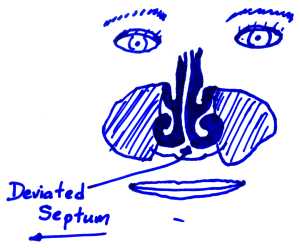Is a Deviated Septum giving you a headache?
Recently I got an email from Scott, who had just been diagnosed with a "deviated septum". He has daily headaches, and was wondering if a deviated septum could be responsible.
First, a little background. What is a deviated septum?
 |
Your nasal septum is the partition between the right and left parts of your nose. When a person has a deviated septum, it’s pulled over to one side or the other (the one in the illustration is deviated to your left).
There can be a number of causes, and sometimes we can’t be sure why one particular person has a deviation. Sometimes surgery can cause this, or an injury, or perhaps a traumatic birth, or it may even occur during the baby’s development in the womb.
Question #1 – can a deviated septum trigger headache symptoms? Yes, in some people it can.
Question #2 – how likely is it that a deviated septum is the primary trigger or cause? In other words, what are the chances that surgery will solve the headache problem in any given person? In most cases, it’s not very likely that surgery will solve your headache problem.
A deviated septum is actually very common – 4 in 5 people have it. One way to see if you might have a deviation is to try breathing through either nostril while blocking the other. If there’s a significant difference in air flow, you may have a deviation.
There are at least two reasons this may cause headaches. Most commonly, the septum may block mucus, causing frequent recurring sinus infection. That’s a major recipe for a headache!
Drs Young and Silberstein have also noticed a different kind of "deviated septum headache", which they write about in their book Migraine and Other Headaches:
Rarely, a deviated septum may cause a one-sided headache on the side toward which the septum deviates. If the septum deviation is causing the headache, placing a small piece of paper soaked in an anesthetic (lidocaine or Novocaine®) will relieve the headache. The treatment is surgical straightening of the deviated sinus.
Note that this is rare – it’s more likely that, if you have problems, it will be with a sinus infection.
If neither of these situations seem to fit you, chances are surgery will not help.
If you do opt for surgery, it’s called a septoplasty, and it’s done in a day. It usually won’t change the look of your nose. It is a fairly safe surgery, though with all surgery there are risks. It won’t instantly cure sinus infections, but it can make you less susceptible. The more deviated the septum was, the greater the improvement usually is. Read more about surgery for a deviated septum here.
Have you had experience with surgery for a deviated septum? Did it help you with your headaches? Leave a comment and tell us about it.
